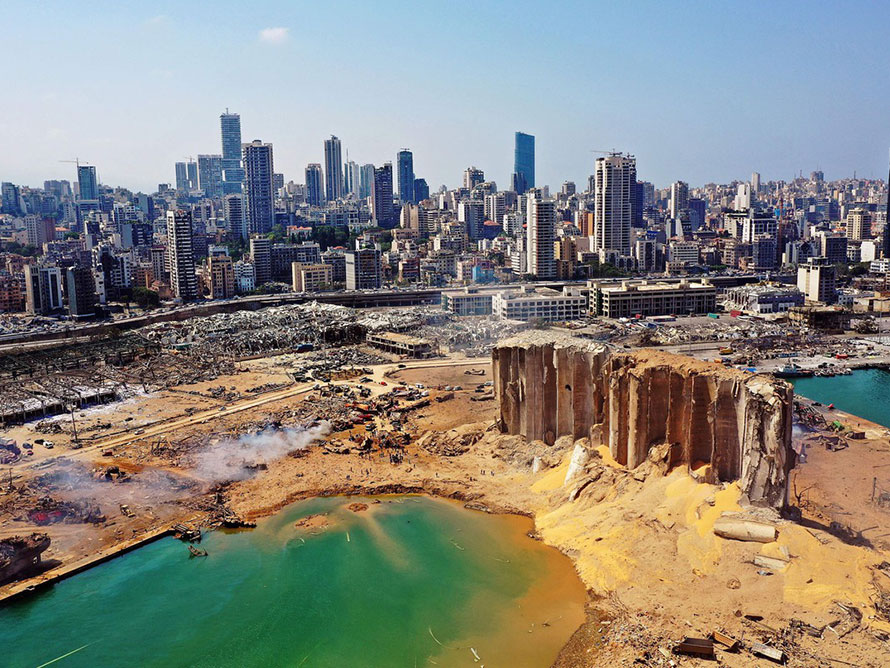Should ammonium nitrate be banned? The deadly explosion in Lebanon is just the latest caused by a common fertiliser. Some say it is essential to modern farming. But others want it outlawed. It vaporised buildings, threw cars into the air, blew out windows, and brought down roofs. It was felt 240 kilometres away in Cyprus. On Tuesday, life in Beirut changed in a matter of seconds. Countless videos captured the moment at 18:08, when a catastrophic explosion tore through the city. A mother giving birth to her baby; a couple’s wedding. Normal life turned upside down by a blast one-tenth the size of the Hiroshima atomic bomb. As Lebanon declares a state of emergency, aerial photos show a city in ruins. In seconds, the blast did more damage to Beirut than 15 years of civil war. Badly damaged hospitals – already overwhelmed by Covid-19 patients – are treating the injured in car parks. Many thousands have been left homeless. The official toll – for now – stands at 137 dead and 5,000 injured. Shock and grief have quickly turned to anger. How did the authorities allow 2,750 tonnes of highly explosive ammonium nitrate to sit in a port warehouse for six years, in the heart of a densely populated city? Whilst the Lebanese demand answers, experts warn this sort of accident is “grimly familiar”. Globally, ammonium nitrate has been responsible for 240 explosions in the last decade, killing hundreds of people. But, if it is so dangerous, why is it not banned? The answer lies in the science of agriculture. When our ancestors began to farm 10,000 years ago, they discovered that the soil must be fed with compost and manure to replace the nitrogen that crops need to grow. The more intensively we farm, the harder it is to keep the land fertile and nitrogen-rich. As the human population grew, so did our impact on the nitrogen cycle. Scientists began to look for a better way to enrich the soil. The invention of chemical fertilisers transformed agriculture forever. It led to a revolution in the 1950s and 1960s, when ammonium nitrate was used alongside other agrochemicals to increase food production. However, its explosive properties also make it a common ingredient for homemade bombs used in terrorist attacks, such as the 1995 Oklahoma City bombing that killed 168 people. Unlike other explosives, it is cheap and easy to acquire, and some countries have responded with tight rules and regulations. But experts say that it is impossible to prevent some of the 21.6 million tonnes produced each year, falling into the wrong hands. Its explosive potential is not the only concern. The fertiliser contaminates drinking water and is linked to increased cases of cancer, diabetes, and birth defects. It also causes algae blooms that kills off life in seas and rivers. Worst of all, its production contributes to CO2 emissions and other greenhouse gasses that cause climate change. We are heavily dependent on fertilisers to feed the growing world population. But there are alternatives, including a solution that would have been familiar to our ancestors: crop rotation. So, should ammonium nitrate be banned? Feed the world Some say yes. The tragic events in Beirut are a wake-up call to the world, but the warning signs have been there for years. Chemical fertilisers damage our health, our environment, and contribute to climate change. And, in the hands of incapable authorities or dangerous groups, ammonium nitrate is a lethal weapon. Others say no. Almost half the world’s population owe their lives to chemical fertiliser. Ammonium nitrate is relatively simple to make and banning it will not stop terrorists from making bombs. It may reduce the likelihood of deadly explosions such as the Beirut explosion – but at the cost of a global famine greater than anything we have seen before. KeywordsAgriculture - The practice of farming and growing food from the land.
Should ammonium nitrate be banned? The deadly explosion in Lebanon is just the latest caused by a common fertiliser. Some say it is essential to modern farming. But others want it outlawed.
Feed the world
Keywords
Agriculture - The practice of farming and growing food from the land.
Climate change - Long-term shifts in temperatures and weather patterns. Human action is a major cause of climate change.
Crop rotation - The practice of planting different crops each year to improve soil health and optimise nutrients in the soil.
Shock turns to anger after Beirut explosion

Glossary
Agriculture - The practice of farming and growing food from the land.
Climate change - Long-term shifts in temperatures and weather patterns. Human action is a major cause of climate change.
Crop rotation - The practice of planting different crops each year to improve soil health and optimise nutrients in the soil.
